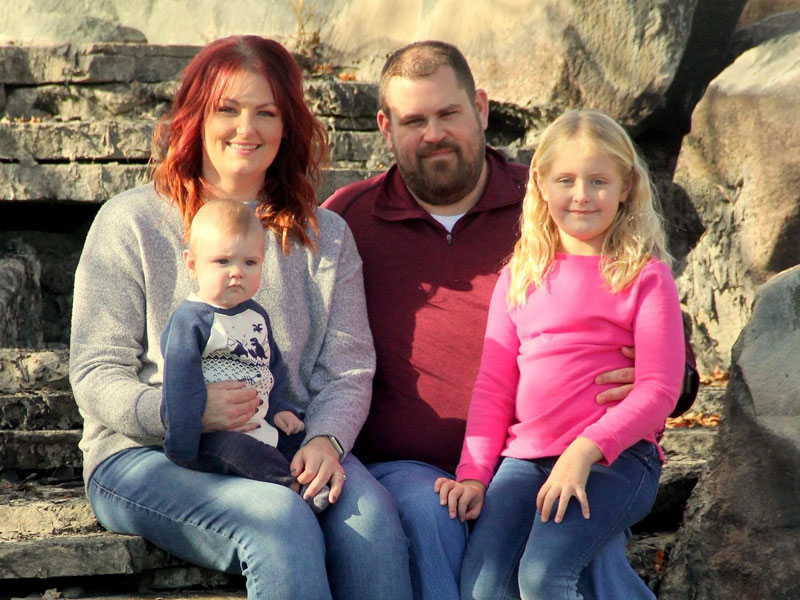Cody Hedberg loves being a father to his two children, and a husband to his wife Michelle.
“I can’t imagine not being here for them.”
But, if he hadn’t been so proactive in dealing with heart issues, he might not be.
Hedberg’s entire family has a history of heart issues. His father underwent a heart transplant in his mid-60s. Hedberg himself was diagnosed with Type 1 diabetes when he was 13.
“I think we’ve been cracked open about 12 times,” said Hedberg, now 39.
It started with a skip
Hedberg became obsessed with his heart checkups. With his family’s future in mind, Hedberg continually talked with his endocrinologist and nurse practitioner at each of his diabetes appointments.
At a routine checkup, Hedberg was told he had an irregular heartbeat, and later underwent a nuclear echocardiogram to measure the blood flow in his heart.
Learn more: Cardiology at Sanford Health
Just hours away from traveling to Texas for work, Hedberg received a call from his cardiologist. He’d need surgery.
“They discovered that there was six full blockages — 100% blockages in the lower half of my heart.
“I could have been on an airplane and things could have gone south. That was probably the first time in my life that made me feel like I was not invincible anymore. There were some major issues that I needed to get addressed,” he said.
At his age, Hedberg isn’t the ideal candidate for an open heart surgery. “But, in my case, if I wasn’t pushing it and asking my primary physicians and other doctors, I don’t think I would be sitting here today,” he said.
Dr. Roxanne Newman is a cardiac surgeon at Sanford Heart and Vascular Clinic in Fargo, North Dakota, and operated on Hedberg’s six bypasses in January. She echoed Hedberg, saying, “had he not been very active in seeking help, some symptoms could be very big.”
“One of the scary things for diabetic patients is they won’t necessarily have those typical symptoms that a lot of patients will get: shortness of breath, feeling fatigue, or something’s just not right. It’s not the typical chest pain that some of the patients may experience.
“He was a big reason why he did so well, because he was an advocate for himself. You should be your best advocate for your own health,” she said.
Continuing rehab
After surgery, Hedberg began rehabilitation with Brad Hintermeyer, exercise physiologist and manager of Sanford Health cardiac rehab in Fargo.
Hintermeyer says that it’s critical to get patients moving as soon as possible after surgery, to expedite the recovery process.
“We find those that attend cardiac rehab or do some sort of movement versus just sitting at home recover so much quicker, and they can resume their day to day activities, their family life, and their work life,” said Hintermeyer.
And for Hedberg, his family was all the motivation he needed.

Photo courtesy of Cody Hedberg
“It’s definitely a change in perspectives. Family’s really important. You’ve got to focus on that. You can’t take things for granted like I had before. I did a lot of traveling with my job, and I’ve tried to pull back on some of that.
“I want to be home, and I want to be around them as they grow up.”
Hedberg began rehab slowly, but he’s ended much stronger than before.
Hintermeyer says seeing the progression Hedberg and other open-heart surgery patients make is unbelievable.
“We will see them day one where it’s just them getting out of a chair, tubes everywhere, and oxygen to day one in our gym where it’s maybe five to 10 minutes of light walking, to today where Cody was walking on his own, lifting weights, he’s on ellipticals, he’s on rowers, and he’s back doing what he should be doing, which is awesome to see.”
‘A lot of these cases are not survivable’
But, Hedberg’s case was unique: He rehabbed during a pandemic.
“It was definitely a shift in protocols. I started cardiac rehab in January. Things moved along fairly quickly. A lot of great things were happening, then all of the sudden different protocols came out. Things like limiting class size, and limiting interaction.
“But it didn’t seem to change the rehab at all. We still have the hands-on direction from staff, and still being able to work out, and take care of what we needed to do,” he said.
Related: Yoga instructor’s scare an example of heart attack in women
Today, Hedberg is thanking himself for not taking a break throughout the COVID-19 pandemic.
“I feel a lot healthier. It’s been a huge improvement for my lifestyle and myself.”
Hedberg considers himself lucky to have caught these issues so early. His call to action? Go to your screenings, and be honest with your doctors, no matter how healthy you think you are.
“There’s a very good chance that I wouldn’t have caught this and something major could have gone wrong. Don’t take that tough man attitude and push it off.
“A lot of these cases are not survivable. I’ve seen many of my family members pass away from heart disease or heart attacks that were just too macho and manly to get any assistance.”
Read more
- Telehealth improves blood sugar for rural diabetes patients
- Pulmonary rehab can help ease COPD
- Your health matters: Don’t delay your care or screenings
…
Posted In COVID-19, Heart, Rehabilitation & Therapy, Specialty Care, Virtual Care
